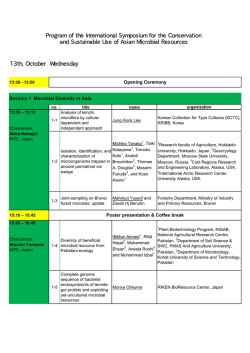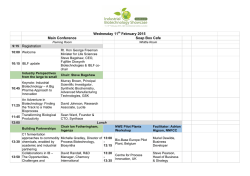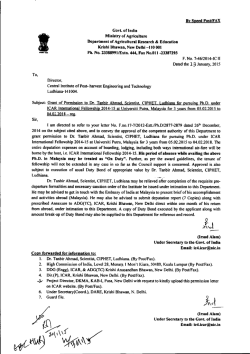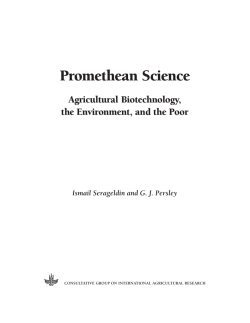
Biotechnology - Indian Council of Agricultural Research
Minimum Standards for Higher Agricultural Education (MSHAE) Biotechnology Education Division Indian Council of Agricultural Research PUSA, New Delhi 110 012 INTRODUCTION Biotechnology has enormous potential to provide solution to several challenges in the food, health care, energy and related sectors. The importance of this high technology sector will become evident as its products catalyse the transformation of Indian economy by offering solutions to the multitude of challenges that both India and the world will encounter in food, health care and fuel security. Furthering these three areas will enable the nation to realize rapid economic development and prosperity. Biotechnology, in agriculture, is a powerful tool to keep pace with the ever burgeoning population for meeting the food and nutritional security and meeting the challenge of escalating biotic and abiotic stresses. Agricultural biotechnology is a collection of scientific techniques used to improve plants, animals and microorganisms. Based on the understanding of DNA, Indian Biotechnologists are trying to augment agricultural productivity and quality of the produce, and to develop climate resilient cultivars. Biotechnology approaches offer novel strategies for producing suitable crop genotypes that are able to resist pathogens, pests, drought, high temperature, submergence and salinity stresses. It enables improvements through facilitating exchange of genetic material even across sexual barriers that is not possible with the conventional methods. Biotechnology is used for precision breeding using molecular marker technology, developing genetically modified crops, producing disease-free planting material, molecular diagnostics and developing vaccines for livestock and humans. Since 1995, farmers have been growing transgenic crops and currently 175 million ha area is under these crops across 27 countries. In India, 85 per cent of the cotton cultivation area is under Bt cultivars. Modern molecular biology and genomic techniques such as MAS (marker assisted selection) help in identifying desirable traits, thereby allowing agricultural scientists to develop varieties that have improved traits such as high yields and resistance to environmental stresses such as drought, pests and diseases. In India, rice varieties like Pusa 1460 and RP Bio-226 (bacterial blight resistant), Punjab Basmati 3 (dwarf and bacterial blight resistant), Swarna Sub1A and IR 64 Sub1A (submergence tolerant) and maize hybrid QPM 9 (high quality protein maize) developed through MAS are under cultivation. To meet increasing demand of Biotechnologists in research institutes and industry, qualified human resource is mandatory. Indian Council of Agricultural Research (ICAR) institutes and Agricultural Universities are to play important role for generating trained human resource through Biotechnology degrees at undergraduate and postgraduate levels. With increasing application of biotechnology in diverse areas such as crop improvement, livestock improvement, industrial microbiology, environmental sciences, etc. the specializations within biotechnology have taken their shape. With fast emerging technologies such as RNAi, targeted gene replacement using zinc-finger nucleases, chromosome engineering, marker assisted recurrent selection, genome wide selection, next generation sequencing technology and nanobiotechnology, the future seems bright with respect to the development of designer crops. Thus, there is need to establish colleges, which are adequately equipped in terms of faculty and laboratories, to promote comprehensive development in the field of biotechnology and the generation of specialized human resource towards wider application of biotechnology approaches for achieving faster development and economic growth leading to national prosperity. This would help in creating a road map for successful and sustainable application of biotechnology in food and agriculture. The initiative of the ICAR towards formulating the comprehensive minimum requirements and standards for establishing Colleges of Biotechnology in Agricultural Universities, ICAR institutes and Deemed Universities is most well-timed and highly praiseworthy. These standards as basic requirements would steer the establishment of new colleges in Biotechnology towards ensuring the delivery of high quality education and strengthening research capabilities in the subject. Punjab Agricultural University, Ludhiana Proceedings of the meeting of the ICAR’s Expert Committee to work out the Minimum Standards of Higher Agricultural Education (MSHAE) in terms of infrastructure, laboratories/field facilities, faculty, man-power and other support so as to firm up guidelines for establishing College of Biotechnology in SAUs/ ICAR Institutes/Deemed Universities, held in the Committee Room of the Vice Chancellor, PAU, Ludhiana on March 8-9, 2014 Following committee members attended the meeting: 1. Dr BS Dhillon, Vice Chancellor, PAU Ludhiana Chairman 2. Dr Anil Sirohi, Dean, College of Biotechnology, SVP Univ. of Agri. & Tech., Modipuram, Meerut Member 3. Dr AK Sankhla, Dean, College of Dairy & Food Science Technology, MPUAT, Udaipur Member 4. Dr HS Dhaliwal, Dean, College of Agriculture, PAU, Ludhiana Member 5. Dr KL Khurana, Principal Scientist, Education Division, ICAR, New Delhi Member Secretary The following scientists also attended the meeting as Special Invitee: 1. Dr DS Brar, Honorary Adjunct Professor, School of Agricultural Biotechnology, PAU, Ludhiana 2. Dr SS Gosal, Director of Research, PAU, Ludhiana 3. Dr (Mrs) JK Sangha, Dean, College of Home Science, PAU, Ludhiana 4. Dr RK Gumber, Additional Director of Research (Crop Improvement), PAU, Ludhiana 5. Dr MIS Gill, Head, Deptt. of Fruit Science, PAU, Ludhiana 6. Dr (Mrs) SK Banga, Head, Deptt. of Plant Breeding and Genetics, PAU, Ludhiana 7. Dr RIS Gill, Head, Deptt. of Forestry and Natural Resources, PAU, Ludhiana 8. Dr PK Chhuneja, Chairman Academic Affairs Committee, COA, PAU, Ludhiana 9. Dr SS Kang, Secretary, Board of Studies, College of Agriculture, PAU, Ludhiana 10. Dr (Mrs) Parveen Chhuneja, Geneticist, School of Agricultural Biotechnology, PAU, Ludhiana 11. Dr BS Cheema, Assoc. Prof. of Agricultural Education, College of Agriculture, PAU, Ludhiana 12. Dr Yogesh Vikal, Geneticist, School of Agricultural Biotechnology, PAU, Ludhiana 13. Dr JS Sandhu, Biotechnologist, School of Agricultural Biotechnology, PAU, Ludhiana The chairman of the committee, Dr BS Dhillon, welcomed the committee members and acknowledged the ICAR for providing an opportunity to the PAU for hosting this important meeting. Dr HS Dhaliwal introduced the Heads of various Departments and other special invitees of College of Agriculture, PAU, Ludhiana to the committee. Dr BS Dhillon introduced the house regarding the background under which the committee was constituted by the ICAR. He also briefed about Biotechnology as a growing sector having enormous potential to provide solutions to several challenges in the food, health care, energy and related sectors. Biotechnological approaches offer novel strategies for producing suitable crop genotypes that are able to resist pathogens, pests, drought and other weather vagaries. ICAR institutes and Agricultural Universities can and need to play an important role to meet increasing demand of Biotechnologists. Dr KL Khurana, in his opening remarks elaborated on the initiative taken by ICAR for taking up this task to workout minimum standards and requirements for opening new institution offering undergraduate and postgraduate degrees in the discipline of Biotechnology. He mentioned the need of strengthening this discipline in Agricultural Universities and other ICAR institutes. Dr (Mrs) Parveen Chhuneja made a power point presentation on proposed Minimum Standards of Higher Agricultural Education (MSHAE) in terms of infrastructure, laboratories/field facilities, faculty, man-power and other support so as to firm up guidelines for establishing College of Biotechnology in Agricultural Universities, ICAR Institutes and Deemed Universities. There were thorough deliberations on the presentation and based on the suggestions from the esteemed members of the committee and other colleagues the final draft has been prepared. Dr Anil Sirohi suggested the institution of scholarships for Biotechnology at ICAR level for attracting the talent. Dr AK Sankhla, on behalf of the members of the committee, acknowledged PAU for providing the requisite assistance in hosting this committee meeting at its campus. He appreciated the concerted efforts of the Dr BS Dhillon, Dr HS Dhaliwal and Dr (Mrs) Parveen Chhuneja and the team for preparing and presenting the detailed draft. The final draft of the MSHAE for establishing College of Biotechnology is enclosed as Annexure-I. Annexure-I Minimum Standards for Establishing a College of Biotechnology in State Agricultural Universities/ICAR Institutes/Deemed Universities 1. Divisions/Section: Three Divisions and One Section Division of Plant Biotechnology (PB) Division of Animal Biotechnology (AB) Division of Microbial and Environmental Biotechnology (MEB) Bioinformatics Section 2. Undergraduate and Postgraduate Degrees Nomenclature Undergraduate B.Tech. Biotechnology Postgraduate M.Tech. Plant Biotechnology (Master’s and Doctorate) M.Tech. Animal Biotechnology M.Tech. Microbial and Environmental Biotechnology M.Tech. Bioinformatics Ph.D. Plant Biotechnology Ph.D. Animal Biotechnology Ph.D. Microbial and Environmental Biotechnology 3. Eligibility Criteria B.Tech. Biotechnology Higher Secondary/10+2/Intermediate Subjects: PCM/PCMB/PCB/Inter (Agriculture) with at least 50% marks in aggregate (P, C, M and B are Physics, Chemistry, Mathematics and Biology, respectively) M.Tech. Plant B.Tech. or equivalent degree in Biotechnology/ B.Sc. Biotechnology Agriculture (Hons.)*/ B.Sc. Horticulture (Hons.)*/ B.Sc. Forestry (Hons.)* with at least 60% marks M.Tech. Animal B.Tech. or equivalent degree in Biotechnology /B.V.Sc.*/ Biotechnology B.Tech. Dairy Technology* with at least 60% marks M.Tech. Microbial and B.Tech. or equivalent degree in Biotechnology/B.Sc. Environmental Agriculture (Hons.)*/B.Sc. Horticulture (Hons.)*/ B.Sc. Biotechnology Forestry (Hons.)*/B.V.Sc.* with at least 60% marks 1 M.Tech. Bioinformatics B.Tech. or equivalent degree in Biotechnology/Bioinformatics with at least 60% marks Ph.D. Plant Biotechnology M.Sc./M.Tech. in Plant Biotechnology/M.Sc. Agriculture having specialization in Plant Biotechnology with at least 60% marks Ph.D. Animal Biotechnology M.Sc./M.Tech. in Animal Biotechnology/M.V.Sc. having specialization in Animal Biotechnology with at least 60% marks Ph.D. Microbial and M.Sc./M.Tech. in Microbial Biotechnology/Environmental Environmental Biotechnology/Plant Biotechnology/Animal Biotechnology/ Biotechnology M.V.Sc. having specialization in Biotechnology with at least 60% marks Note: B.Tech. is equivalent to B.Sc. 4 year programme; *Deficiency courses to be cleared 4. Medium of Instruction: English 5. Minimum Intake Degree Discipline Minimum Intake/Year B.Tech. Biotechnology with elective in 4 disciplines 50 M.Tech. Plant Biotechnology 8 Animal Biotechnology 8 Microbial and Environmental 8 Biotechnology Ph.D. Bioinformatics 8 Plant Biotechnology 4 Animal Biotechnology 4 Microbial and Environmental 4 Biotechnology Total 6. Undergraduate 50 Master’s 32 Doctorate 12 Land Requirements Main building and hostels: 4 ha Field area: 10 ha Play grounds: From common facility of the institute Total: 14 ha 2 7. Manpower Requirements of Dean’s Office Manpower Number Dean 1 A. Establishment PA to Dean 1 Administrative Officer 1 Superintendent 1 Steno/Computer operator 4 Assistant 2 Operator (Audio Visual) 1 Attendants/Messengers 4 Clerk (LDC) 4 Electrician 1 Store Keeper 1 Driver 6 Security, Sanitation and Landscaping To be outsourced B. Central Research and Teaching Laboratories (Four Laboratories) Assistant Professor (Genomics) 1 Assistant Professor (Computer Engineering) 1 Computer Assistant 1 Laboratory Technicians 2 Laboratory Assistant 1 Laboratory Attendant 3 C. Library Staff Assistant Librarian 1 Library Assistant 1 Clerk 1 Shelf Assistant 2 D. Students Welfare To be provided by the Institute as the Central Facility 3 E. Hostel Staff for two Hostels Wardens 1+1 Assistant Wardens 1+1 Clerk (LDC) 2 Attendants 8 Security, Sanitation and Landscaping 8. To be outsourced Faculty Requirements for Divisions/Section Division/Section Division of Plant Biotechnology 1 Faculty Associate Professor 2 Division of Animal Biotechnology 1 2 6 9 Division of Microbial and Environmental Biotechnology Bioinformatics Section 1 2 6 9 - 1 4 5 Total 3 7 22 32 Professor Total Assistant Professor 6 9 Note: Services of the existing faculty will be utilised for teaching the supporting courses 9. Administrative and Supporting Staff for Divisions/Section Division/ Section Plant Biotechnology Animal Biotechnology Steno/PA/ Computer Operator Assistan t Attendant/ Messenger Clerk Laboratory Assistant/ Attendant Field Staff 2 1 2 1 6 3 2 1 2 1 6 3 2 1 2 1 6 3 5 1 2 1 1 - 11 4 8 4 19 9 Microbial and Environmental Biotechnology Bioinformatics Section Total Note: Security services to be outsourced 4 10. Faculty Expertise Division/Section Faculty Expertise Core Plant Biotechnology Associated Plant Molecular Biology, Plant Breeding, Tissue culture and Genetic Plant Protection, Transformation, Plant Physiology, Genetics, Agronomy, Microbiology, Horticulture, Plant Biochemistry Forestry Animal Cell Culture and Genetic Transformation, Animal Breeding, Biotechnology Molecular Biology, Animal Physiology, Animal Genetics, Live Stock Production Animal Biochemistry, and Management Animal Microbiology, Immunology Microbial and Microbiology, Plant Physiology, Environmental Microbial Genetics, Water and Soil Biotechnology Microbial Engineering, Biochemistry Sciences, Analytical Chemistry, Agrometeorology, Food Science and Technology Bioinformatics Bioinformatics, Plant and Animal Section Information Technology Biotechnology, Statistics/ Biostatistics 5 11. Central/Division/Section Laboratories (as per requirements of the teaching and research work of the college) Division/Section Laboratory Central Research and - DNA sequencing, SNP Genotyping and Proteomics Teaching Laboratories Laboratory - High Performance Computing Facility - Cold Rooms: -20oC, 4oC - Liquid Nitrogen Plant - Computer Lab Plant Biotechnology - Plant Genomics Laboratory - Functional Genomics Laboratory - Genetic Transformation Laboratory - Molecular Breeding Laboratory - Proteomics and Metabolomics Laboratory Animal Biotechnology - Animal Genomics Laboratory - Functional Genomics Laboratory - Arthropod Molecular Biology Laboratory - Animal Cell culture Laboratory - Immunology Laboratory Microbial and - Microbial Genetics and Genomics Laboratory Environmental - Environmental and Soil Microbiotechnology Laboratory Biotechnology - Bioremediation Laboratory Bioinformatics Section - Sequence Analysis Laboratory - Computational Biology Laboratory 6 12. Floor Space Requirement Central Facilities S. No. Details Number of Dimensions Rooms 1. Dean office 1 20′ x 24′ 2. PA room 1 20′ x 12′ 3. 1 20′ x 48′ 4. Committee room with video conferencing facility Administrative officer room 1 20′ x 12′ 5. Admin. staff rooms 3 20′ x 36′ each 6. Examination cell 1 20′ x 12′ 7. Evaluation room 1 20′ x 36′ 8. Faculty room 1 20′ x 12′ each 9. Placement cell 1 20′ x 48′ 10. Smart Lecture rooms 5 Seating capacity - 70 11. Auditorium (optional) 1 Seating capacity - 300 12. Library/Book bank 1 30′ x 72′ 13. Examination hall (optional) 1 Seating capacity - 300 14. Multipurpose room 1 20′ x 36′ 15. Laboratories 4 30′ x 48′ each 16. Hostels 2 17. Generator shed 1 UG and PG Boys, UG and PG Girls 20′ x 36′ 18. Liquid Nitrogen plant 1 20′ x 24′ 19. Toxic chemical waste storage/disposal Unit Canteen 1 20′ x 24′ 1 20′ x 12′ (kitchen) & 20 x 36′ 20. (sitting) 21. Toilets 22. Parking space As per requirement (APR) 23. Vehicles: Office car Staff car/Jeep Bus Pick-up van 1 3 1 1 7 2 sets for each floor For college and hostels Division/Section S. No. 1. 2. 3. Detail Number of rooms Dimensions Office of Head of the Division Administrative Staff Faculty room 3 (one for every Division) 20′ x 24′ each 4 (one for every Division) 20′ x 36′ each 21 (as per faculty strength) 20′ x 24′ (3 rooms) 20′ x 12′ (18 rooms) Rooms for 4 (one for every Division) 20′ x 24′ each Research Scholars 5. Committee room 4 (one for every Division) 20′ x 36′ each cum library 6. Smart Lecture 4 (one for every Division) Seating capacity - 50 each cum seminar room 7. Laboratories (no. of laboratories as per requirement and include UG and PG teaching 4. laboratories) Plant Biotechnology 5 20′ x 60′ (one) 20′ x 36′ (four) Animal Biotechnology 5 20′ x 60′ (one) 20′ x 36′ (four) Microbial and Environmental 4 20′ x 36′ (three) Biotechnology 8. 20′ x 60′ (one) Bioinformatics Section 2 Screen houses, glass houses, APR transgenic green house 8 20′ x 48′ each 13. Equipment Required Central Teaching and Research Laboratories S. No. Name of the Equipment Number 1 Sequencer - ABI 3730xl 1 2 Illumina Sequencing Platform 1 3 Cold room -20◦C 1 4 Cold room 4◦C 1 4 SNP Genotyping Platform 1 5 HPTLC 1 6 High Performance Computing Grid 1 7 Liquid Nitrogen Plant 1 8 Inductively Coupled Plasma (ICP-OES) 1 Central laboratory 9 High Speed Centrifuge 4 10 Water Purification Unit As per requirement Equipment in the Divisional Laboratories (additional specialised equipment may be required depending on the mandate of the institute) S. No. 1 Name of the Equipment -20◦C Freezer ◦ Divisions# Number of units Total x Divisions number 2x3 6 PB, AB, MEB 2 -80 C Freezer 1x3 3 PB, AB, MEB 3 Autoclaves 2x3 6 PB, AB, MEB 4 Automated Capillary Electrophoresis System 1x3 3 PB, AB, MEB 5 Autopipetting System 1x2 2 PB, AB 6 Biolistic Particle Gun 1x1 1 PB, AB 7 Biophotometer 1x3 3 PB, AB, MEB 8 Biosafety Cabinet 4x3 12 PB, AB, MEB 9 Centrifuge 8x3 24 PB, AB, MEB 10 Cryo-cans 5x3 15 PB, AB, MEB 9 11 Dry Baths APR - PB, AB, MEB 12 Electrophoresis Systems and Power Packs 10x3 30 PB, AB, MEB 13 Electroporator 1x3 3 PB, AB, MEB 14 Environmental Chamber 1x3 3 PB, MEB 15 Fermenter 2x1 2 MEB 16 Fluorescent Microscope 1x2 2 PB, AB 17 2x3 6 PB, AB, MEB 18 Gel Documentation System Gel Dryers 1x3 3 PB, AB, MEB 19 Growth Rooms 2x1 2 PB 20 Hot Plates, Magnetic stirrers, Vortex etc. APR - PB, AB, MEB 21 Hybridization Ovens 1x2 2 PB, AB 22 Ice Making Machines 1x3 3 PB, AB, MEB 23 Incubator Shakers 4x3 12 PB, AB, MEB 24 Incubator APR - PB, AB, MEB 25 Laminar Flow 3x3 9 PB, AB, MEB 26 Lypholyser 1x3 3 PB, AB, MEB 27 Microcentrifuge 10x3 30 PB, AB, MEB 28 Microplate Washer 1x2 2 PB, AB 29 Microscope 1x3 3 PB, AB, MEB 30 Microscopes (for teaching) Microplate Readers 10x2 20 PB, AB 1x2 2 PB, AB Microwave Digestion Oven Multiflow Dispenser 1x1 1 MEB 2x3 6 PB, AB, MEB 34 Nanodrop for DNA Quantification 1x3 3 PB, AB, MEB 35 Precision Ovens APR - PB, AB, MEB 36 Plant Imager 1x2 2 PB, MEB 37 Plate Centrifuges 2x3 6 PB, AB, MEB 38 Real Time PCR 2x3 6 PB, AB, MEB 39 Refrigerator 4◦C 4x3 12 PB, AB, MEB 40 Semi Dry Blotter 1x3 3 PB, AB, MEB 41 Shakers (Table Top) 3x3 9 PB, AB, MEB 31 32 33 10 42 Spectrophotometer 1x3 3 PB, AB, MEB 43 Thermocycler 10x3 30 PB, AB, MEB 44 Thermomixer 4x3 12 PB, AB, MEB 45 Tissue lyser 2x3 6 PB, AB, MEB 46 Ultracentrifuge 1x3 3 PB, AB, MEB 47 Ultrasound Sonicator 2x3 6 PB, AB, MEB 48 UV Transilluminator 2x3 6 PB, AB, MEB 49 UV Stratalinker 1x2 2 PB, AB 50 Vacuum Concentrator 1x3 3 PB, AB, MEB 51 Water Bath - Shaking 2x3 6 PB, AB, MEB 52 Computers - 50 PB, AB, MEB 53 Computer for Bioinformatics Section 40 40 Bioinformatics 54 Major Softwares-CLC Genomics and other relevant softwares Internet Facility APR APR Bioinformatics - - Central facility 55 11 College of Biotechnology: Overview B. Tech.. Biotechnology-50 Division of Plant Biotechnology M. Tech. Plant Biotechnology-8 Ph.D. Plant Biotechnology-4 Dean Division of Animal Biotechnology Division of Microbial and Environmental Biotechnology Bioinformatics Section M. Tech. Animal Biotechnology-8 Ph. D. Animal Biotechnology-4 M. Tech. Microbial and Environmental Biotechnology-8 Ph.D. Environmental Biotechnology-4 M. Tech. Bioinformatics-8 College of Biotechnology: Faculty Central Office- Dean-1, Assistant Prof.-2 Division of Plant Biotechnology Professor-1, Associate Professor2, Assistant Professor-6 Dean Division of Animal Biotechnology Professor-1, Associate Professor-2, Assistant Professor-6 Division of Microbial and Environmental Biotechnology Bioinformatics Section Professor-1, Associate Professor2, Assistant Professor-6 Associate Professor-1, Assistant Professor-4 College of Biotechnology: Supporting Staff Divisions/ Section Plant Biotechnology Steno/PA/Computer Operator-2, Assistant1, Attendant-2, Clerk-1, Laboratory staff-6, Field staff-3 Animal Biotechnology Steno/PA/Computer Operator-2, Assistant1, Attendant-2, Clerk-1, Laboratory staff6, Field staff-3 Microbial and Environmental Biotechnology Steno/PA/Computer Operator-2, Assistant1, Attendant-2, Clerk-1, Laboratory staff-6, Field staff-3 Bioinformatics Steno/PA/Computer Operator-5, Assistant1, Attendant-2, Clerk-1, Laboratory staff-1 Establishment Dean College Library Hostel Staff Central Teaching and Research Laboratories PA to Dean -1, Admin. Off.-1, Supdt.-1, Steno/Computer operator-4, Assistant-2, Operator (Audio Visual)-1, Attendants/Messengers-4, Clerk-4, Electrician-1, Store Keeper-1, Driver-6 Asstt. Librarian-1, Library Assistant-1, Clerk-1, Shelf Assistant-2 Computer Assistant-1 Lab. Technicians -2, Lab Asst.-1, Lab. Attendant-3 Wardens-2, Asstt. Warden-2, Clerk-2, Attendants8
© Copyright 2026



